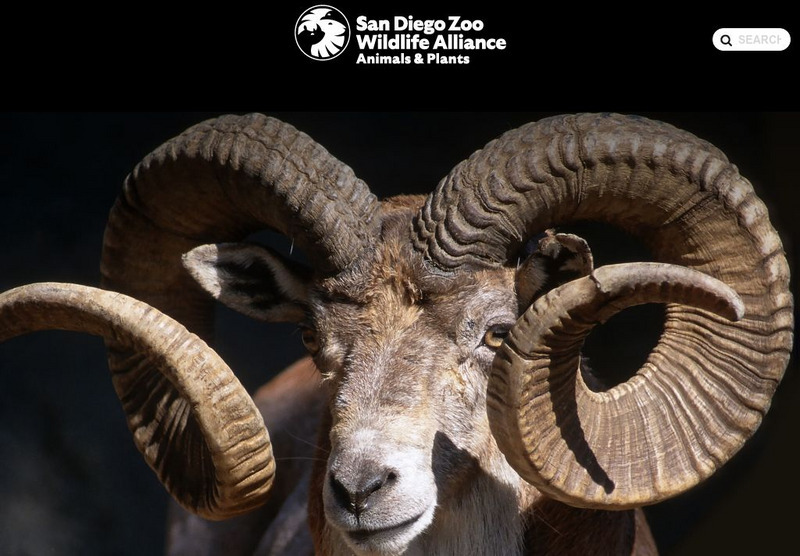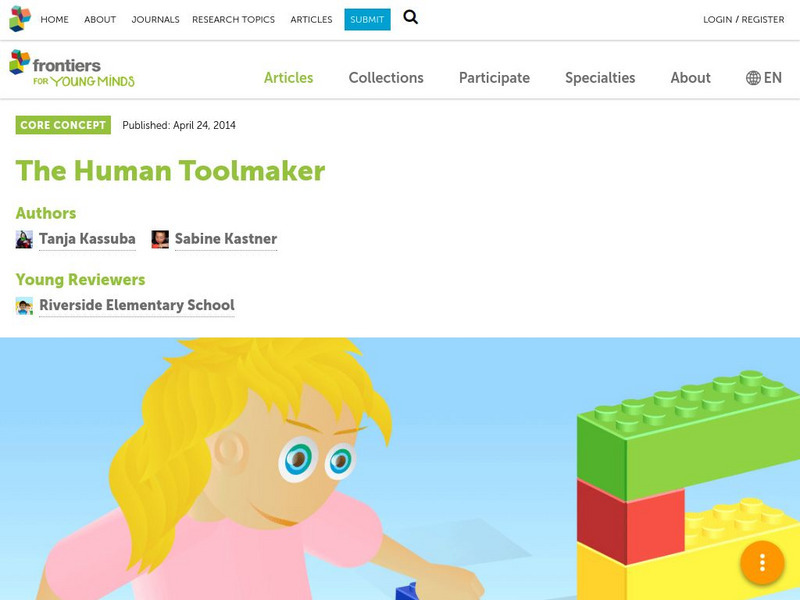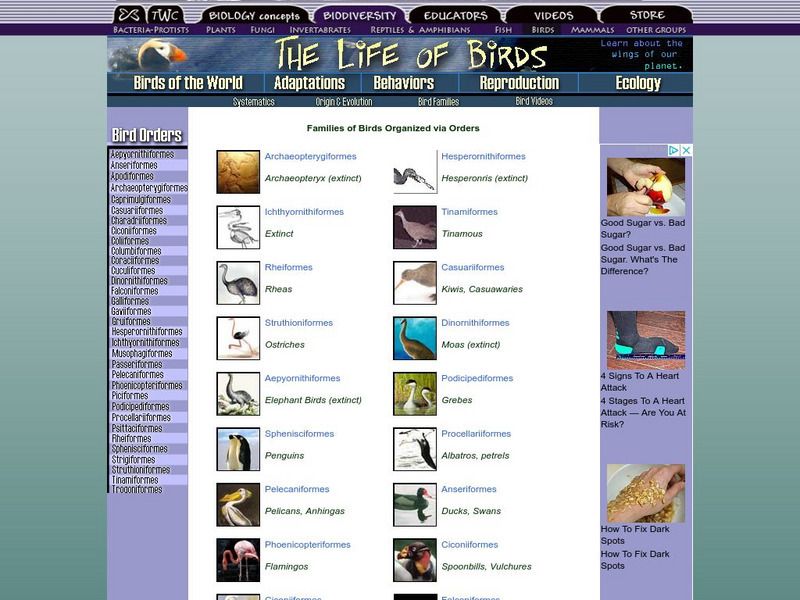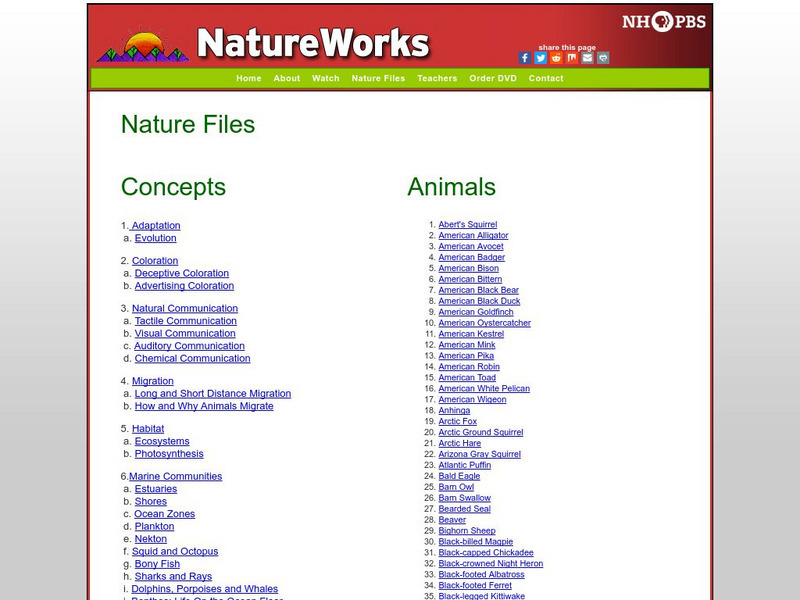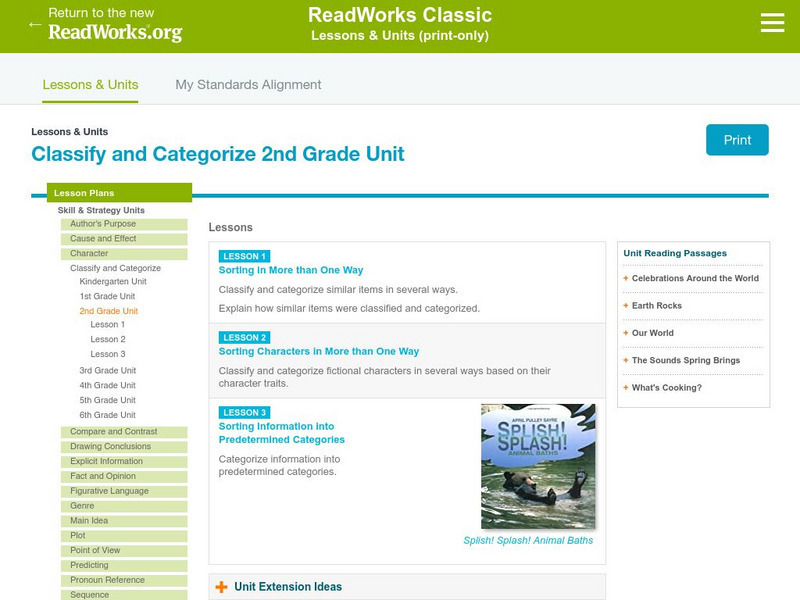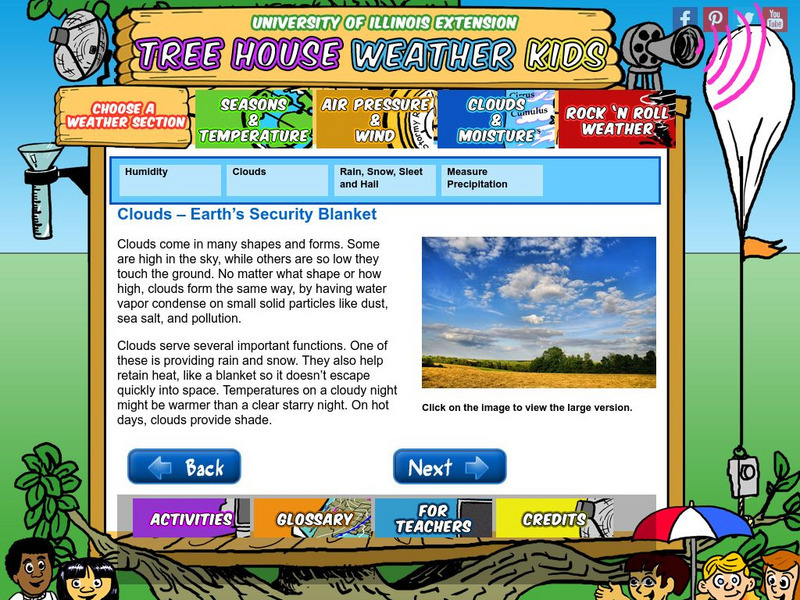CK-12 Foundation
Ck 12: Life Science: Organization of Living Things
[Free Registration/Login may be required to access all resource tools.] When you see an organism that you have never seen before, you probably put it into a group without even thinking. If it is green and leafy, you probably call it a...
Canadian Wildlife Federation
Hinterland Who's Who: Wildlife
Find an wide range of information on an incredibly wide range of species in Canada, including those that are at risk.
E-learning for Kids
E Learning for Kids: Science: Caribbean Sea: Mexico: What Is Classifying?
Christina wants to classify all kinds of different things. Help her sort things into main groups.
CK-12 Foundation
Ck 12: Life Science: 11.9 Organization of Living Things
Learn the system that scientists use to classify living things.
University of California
Ucmp: Introduction to Ctenophora
This is an advanced level review of the biology of these organisms. The opening photographs are worth seeing!
CK-12 Foundation
Ck 12: Biology: Animals: Overview Study Guide
This comprehensive study guide covers the main terms and concepts needed for a biology unit on animals.
Estrella Mountain Community College
Estrella Mountain Community College: The Diversity of Life
Detailed information about each of the five kingdoms. Each kingdom is separately described, but information is also summarized in a table.
CK-12 Foundation
Ck 12: Third Grade Science
This customizable digital textbook covers topics related to third-grade science. It is Next Generation Science Standards (NGSS) aligned.
Extreme Science
Extreme Science: Animal Kingdom: Creepy Crawlies: Goliath Beetle
How do scientists know that the goliath beetle is the largest beetle? What's stopping them from getting even bigger? Find the answers to these questions and other interesting facts from Extreme Science.
ClassFlow
Class Flow: Animal Classification
[Free Registration/Login Required] This is a flipchart for first graders to learn about mammals, fish, birds, amphibians and reptiles.
Other
The Nature Conservancy of Hawaii: A Guide to the Order of Trilobites
The trilobite of the months greets you on this award winning site that provides an immense data base of facts on this fascinating but extinct arthropod. Start with the Introduction in the left hand menu bar for easy to understand...
San Diego Zoo Global
San Diego Zoo: Goats
An in-depth description of goats, including their classification, appearance, habitat, adaptations, reproduction, diet, and other interesting facts. Also includes pictures, video, and sound bytes.
Vision Learning
Visionlearning: Early Ideas About Matter: From Democritus to Dalton
Site that deals with the basics of matter. An interactive animation goes through experiments conducted in the 19th Century to help come up with scientific laws. With each section there are questions for comprehension.
Nature Conservancy
The Nature Conservancy: Gardens Activity Guide: Habitats
In this lesson students learn how the garden provides habitat for a variety of different animal species. They make observations and collect data to determine which species inhabit the garden. They will investigate relationships among...
Frontiers Media
Frontiers: Human Toolmaker
Do you enjoy building airplanes, cars, houses, or robots with Lego blocks? Humans are the only animal species that can create complicated constructions from simple Lego blocks - our Lego building ability is "human-specific," since it is...
Extreme Science
Extreme Science
Explore the science behind the "extremes" in our world. Organized into sections on earth science, the animal kingdom, technology, and space science, this site opens your eyes to giant creatures, amazing technological advances, vast...
Other
The Wild Classroom: Bird Orders of the World
Find information here about all the bird orders in the animal kingdom. Includes living and extinct species.
Biology 4 kids
Biology4 Kids: Sponges the First Invertebrate
Find out about some the most simple organisms in the Animal Kingdom, the sponges.
TED Talks
Ted: Ted Ed: Why Isn't the World Covered in Poop?
Each day, the animal kingdom produces roughly enough poop to match the volume of water pouring over Victoria Falls. So why isn't the planet covered in the stuff?
PBS
Nh Pbs: Nature Works: Nature Files
Resources to accompany a 16-episode science series created to help young minds better understand how plants and animals interact with their environment. A fantastic resource for elementary science teachers that includes state standards...
Wikimedia
Wikipedia: Arthropod
Wikipedia offers information on arthropods, the largest phylum of animals. Includes scientific classification chart and image.
Read Works
Read Works: Classify and Categorize 2nd Grade Unit
[Free Registration/Login Required] A series of three lesson plans designed to teach students to classify and categorize items, characters, and information. The third instructional activity is based on the book Splish! Splash! Animal...
BBC
Bbc Science & Nature: Blue Whale
Get the facts on the largest animal in the world- past and present. This site provides a detailed fact sheet and photos.
University of Illinois
University of Illinois Extension: Tree House Weather Kids: Clouds and Moisture: Clouds: Earth's Security Blanket
Animated resource helps young researchers understand clouds, cloud formation, and types of clouds.
Other popular searches
- Animal Kingdoms
- Kingdom Animal
- Animal and Plant Kingdom
- 5 Animal Kingdoms
- 7 Animal Kingdoms
- Five Animal Kingdoms
- Video on Animal Kingdoms
- Six Animal Kingdoms
- Plant and Animal Kingdoms
- Animal Kingdoms Plants
- Kingdom Animal Graeme Base
- Kingdom Animal Diversity









